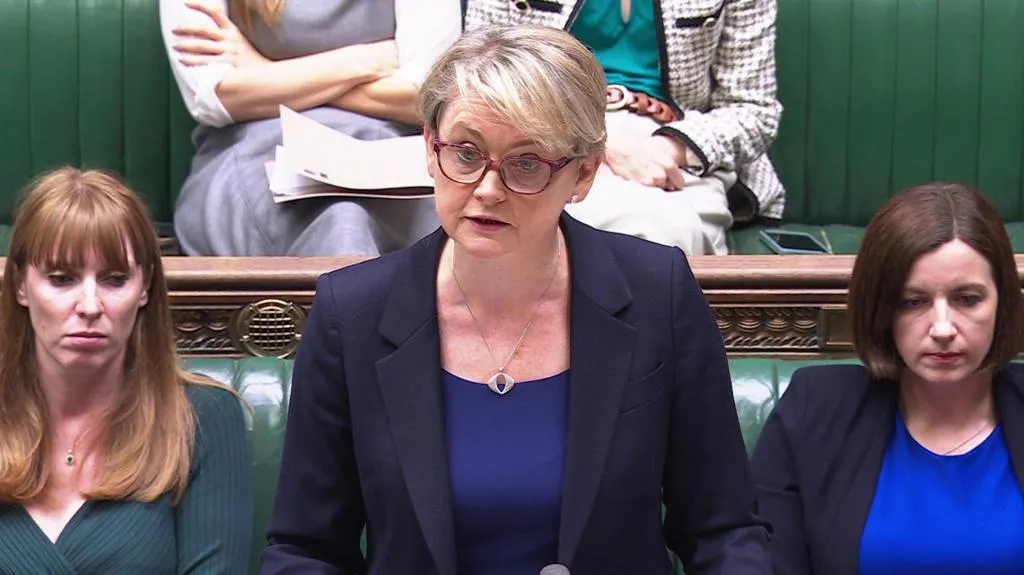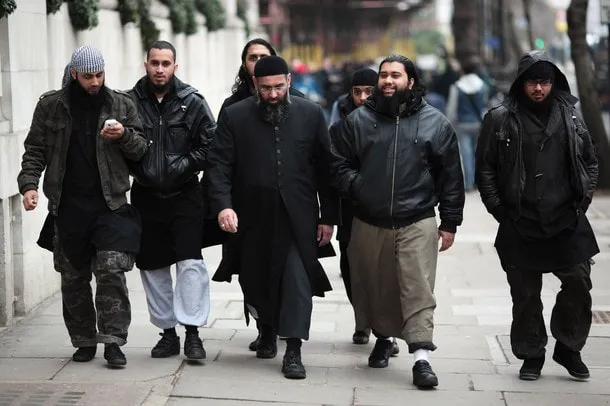Starmer's Grooming Gang U-Turn SHAMES Labour
Labour’s dramatic U-turn explodes into public view as Yvette Cooper confirms mass grooming by Pakistani gangs—after years of denials, silence, and delay.
The Home Secretary, Yvette Cooper, has delivered a significant and politically fraught statement to Parliament—making a complete U-turn by the Labour Government on the subject of grooming gangs, ethnicity, and institutional failure in responding to child sexual exploitation. Her statement confirmed the immediate acceptance of all 12 recommendations put forward by Baroness Louise Casey following the Government’s commissioned audit into the ethnicity and systemic handling of group-based child sexual exploitation.
Cooper began by referencing the recent conviction of seven men in Rochdale—taxi drivers and market traders of Pakistani heritage—found guilty of historical offences committed between 2000 and 2006. The case had taken more than 20 years to reach justice.
Paying tribute to the “bravery of the women who spoke up”, Cooper stated they
“should never have been let down for so long”.
She described the crimes as “heinous” and “a stain on our society”, admitting that institutional failures to act over several decades had allowed abuse to flourish.
She went on to confirm that the Government will now enact wide-reaching legal and policing reforms, including the launch of a statutory national inquiry, a mandatory reporting duty, and aggravated sentencing enhancements for grooming offences. The confirmation represents a sharp departure from Labour’s historic position on the matter.
Only months ago, both Sir Keir Starmer and Yvette Cooper had opposed and voted against such an inquiry, dismissing the push for it as a populist response promoted by the far right. Yet in today’s Commons address, Cooper acknowledged that the Casey audit confirmed a pattern of disproportionate offending by men of Pakistani heritage in areas such as West Yorkshire, Greater Manchester, and South Yorkshire.
Although two-thirds of national data failed to record the ethnicity of perpetrators—a point Cooper called “ridiculous”—the audit revealed that where ethnicity had been recorded, there was a huge and very significant overrepresentation of Asian men, mainly of Pakistani heritage among group-based child sex offenders. The Home Secretary also revealed that asylum seekers were among the offenders in several high-profile cases. Going forward, any individual convicted of such crimes will be barred from receiving asylum in the UK.
Crucially, Cooper told the House that “we cannot and must not shy away from these findings”, aligning Labour with Baroness Casey’s conclusion that obfuscation and fear of being labelled racist had, in many cases, prevented the prosecution of child sex crimes. The Home Secretary quoted Casey’s line that “instead of examination, we have seen obfuscation”, and stated that avoiding these uncomfortable truths had enabled abusers to exploit institutional paralysis.
The new reforms signal the most serious national reckoning yet with the historical mishandling of group-based child sexual exploitation. The new statutory national inquiry will be backed by legal powers to compel testimony, overseen by a formal commission, and work in tandem with a newly empowered National Crime Agency operation.
The 12 formal recommendations accepted in full by the Government are as follows:
- Introduce a mandatory reporting duty for professionals who suspect child sexual abuse
- Launch a statutory national inquiry into institutional failure to address grooming gangs
- Establish a new National Crime Agency-led police operation to target group-based exploitation
- Create a legal requirement for recording ethnicity and nationality data in all child sexual abuse investigations
- Tighten criminal definitions so any adult engaging in penetrative sex with a child under 16 will face a charge of rape, with no excuse or mitigating defence
- Reform taxi and private hire licensing laws to improve safety and enforcement in areas linked to exploitation
- Quash previous convictions of known victims who were criminalised while being exploited
- Improve inter-agency data sharing to identify and intervene in potential abuse cases earlier
- Overhaul safeguarding procedures in children's services, especially for high-risk and care-involved children
- Implement targeted measures to combat online exploitation, including grooming through social media
- Provide expanded support services for child sexual abuse victims, including long-term counselling and rehabilitation
- Ensure local accountability through additional inquiries and reviews under the direction of the national commission
The Government has committed to immediate implementation, with national directives already being issued to begin coordinating police, social services, and local authorities. This will formally reclassify grooming gangs as organised crime networks in law enforcement frameworks, with corresponding escalation in investigative powers and sentencing policy.
This policy reversal will carry deep political ramifications for Labour. Previously, both Cooper and Starmer had refused to acknowledge any connection between ethnicity and organised grooming, warning against “scapegoating” entire communities.
But today, the official position is unambiguous. They now accept that there is a real and documented high level of disproportionality in the representation of certain ethnic groups—particularly men of Pakistani and broader South Asian heritage—among perpetrators of group-based child sex offences.
What was once characterised as a far-right talking point is now a fully accepted fact and the subject of national policy. The Labour Government, under mounting public pressure and in the face of unignorable evidence, has not only reversed its stance but moved to institutionalise long-delayed reforms. Whether this shift restores public confidence in the justice system or merely highlights the cost of delay remains to be seen.
Long Term Implications:
While today’s announcement marks a clear escalation in enforcement and inquiry strategy, the Casey report has now confirmed the sheer scale of the problem is significantly larger than previously acknowledged. Several researchers and criminal justice analysts have long observed a persistent massive overrepresentation of offenders from Pakistani heritage backgrounds in group-based child sexual exploitation cases, particularly of vulnerable young white girls in towns such as Rotherham, Rochdale, Keighley, Telford, and Oxford.
Independent academic studies, including those published by the Quilliam Foundation and others reviewed by the Home Office, have drawn attention to the disproportionate prevalence of offenders within this specific demographic when measured on a per capita basis, despite initial reluctance from successive governments to formally recognise any ethnic or cultural patterns.
So now that the findings of the Casey review have fully aligned with these earlier data sets—as was widely expected they would do—this now represents a major turning point in policy discourse and official acknowledgment.
The report has now not only confirmed this disproportion but also shown that existing statistics have massively underreported the true extent of ethnic concentration among offenders, in part due to inconsistencies in data collection, local authority suppression of demographic identifiers, and a reluctance to publish ethnic breakdowns for fear of inflaming community tensions.
The review also confirmed highly incongruent Ideological and cultural drivers from within the Islamic Faith—including attitudes rooted in patriarchal interpretations of honour, status, and the objectification of women outside the offenders’ own perceived community—as material factors that enabled and sustained prolonged abuse in a number of cases.
The report also made clear the firm link between certain migration pathways—particularly irregular and undocumented routes—and the emergence of grooming networks. And that failures in border enforcement, identity verification, and community monitoring have allowed perpetrators with existing records or known risk indicators to move freely between regions, exploiting jurisdictional fragmentation.
These findings now confirmed have also raised significant questions around previous safeguarding protocols, the accuracy of the datasets used in the Alexis Jay report, and the adequacy of the current risk assessment frameworks used by local safeguarding boards.
More controversially, they have placed renewed political pressure on national policing bodies and the Home Office to re-evaluate their approach to ethnic monitoring, community liaison, and ideological risk screening in both immigration and policing policy. So the next phase of the grooming gangs inquiry process will now have to enter previously uncharted legal, political and religiously ideological territory.
Ideological Implications and fallout:
The Casey review has now also, explicitly acknowledged a fundamental cultural and ideological incompatibility between core tenets of British public life and doctrinal attitudes found within of Islam, as practiced by men involved in group-based child sexual exploitation cases across England.
The document, directly attributes the repeated targeting of vulnerable, underage, predominantly White British girls to a system of embedded cultural values held by the mainly Pakistani Muslim male perpetrators—values rooted in what it describes as “ideological gender supremacy and religiously framed dehumanisation”.
This marks a radical departure from the language of previous reviews, which stopped short of naming religious belief systems or their cultural offshoots as causal factors. For the first time, an official statutory-level government document has confirmed that in a statistically significant number of cases, perpetrators were motivated or justified by belief structures that framed non-Muslim women, particularly young White girls, as impure, inferior, or morally unprotected.
The report further goes on to note that these ideological drivers were not random aberrations or individual perversions, but were replicated across multiple local authorities, across time, and in structurally similar offending patterns—involving coercion, grooming, intergenerational collaboration, and the systemic avoidance of detection using culturally enforced silence or honour-based intimidation.
The review does not limit its criticism to offenders alone. It also includes sharp observations on institutional hesitation within law enforcement, social services, and even elements of the judiciary, where concerns about appearing racist or stigmatising Muslim communities allegedly contributed to the sustained failure to name and confront the religious and cultural dynamics at play.
The consequences of these findings are already being considered at the highest levels of government. One senior Home Office adviser described the implications as “profound” and warned of an incoming policy debate over the limits of cultural tolerance in a liberal democracy. Internal policy memos, circulated to Whitehall departments last week, suggest there will now be a re-examination of integration policy, Prevent strategy criteria, and the oversight of faith-led institutions.
On a societal level, the report’s conclusions are likely to lead to the deepest recalibration yet of Britain’s multicultural framework. The foundational assumptions of post-1997 social cohesion policy—based on the premise that all religious and cultural ideologies are fundamentally reconcilable within British constitutional norms—are expected to face their most serious legal and philosophical challenge to date.
Muslim organisations, many of whom have long campaigned against generalisations and stigmatisation, are now anticipated to face calls to respond in detail to the doctrinal references cited in the report. Where Islamic scripture or jurisprudence has been cited by offenders as justification, the burden of public refutation may now fall upon religious leaders themselves, many of whom will be required to engage in formal rebuttal and theological clarification in the national interest.
Legal analysts suggest this report could open the door to legislative amendments targeting cultural and ideological extremism not limited to violence, expanding the definition of non-violent extremism to include coercive patriarchal structures that facilitate criminal harm.
The national political consequences of a government-backed report now confirming ideological incompatibility between parts of Islamic teaching and British law will now escalate tensions around community policing, asylum admissions from ideologically rigid societies, and the public funding of religious institutions.
What began as an investigation into failures of safeguarding is now poised to ignite a far wider national debate on values, ideology, and the limits of pluralism within the United Kingdom’s legal framework.
Well, that’s all for now. But until our next article, please stay tuned, stay informed, but most of all stay safe, and I’ll see you then.









